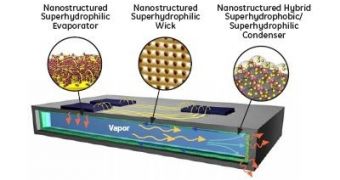Currently, copper is seen as the most effective material for cooling purposes, especially when it comes to CPUs and other sorts of processors, but a team of scientists from General Electric claims to have come up with a much better solution.
Chips nowadays, be they DRAM chips, NAND units or processing units (CPUs, GPUs etc.), can accomplish great things, especially compared to years and decades ago.
However, the more powerful a chip gets, and the further it is pushed, the hotter it becomes, meaning that cooling solutions have to be able to bear with it.
At present, copper is seen as the better choice for making heatsinks, since it can absorb heat very fast and conduct it away just a quickly.
Nevertheless, even this metal has its limits, so a team of scientists from GE (General Electric) decided to try their luck at coming up with a better material.
Apparently, they succeeded, having invented a prototype substrate which is four times lighter than copper while, at the same time, twice as effective at the act of cooling.
The technology was not fully detailed, but it appears to rely on a process involving cool water being vaporized and later condensed back into liquid form, only to be sent back to be vaporized again.
Impressively enough, the device tested by the team successfully achieved this task in conditions of 10 times normal gravity.
“For computing to go faster and electronics systems to become more capable, better cooling solutions such as GE’s prototype substrate will be required to allow this to happen,” stated Dr. Tao Deng, a senior scientist at GE Global Research and the project leader.
“In demonstrations, GE’s prototype substrate has functioned effectively in a variety of electronics application environments. We also subjected it to harsh conditions during testing and found it could successfully operate in extremely high gravity applications.”
It is unclear when, if ever, the material will reach the market, and its price will, no doubt, be the deciding factor.

 14 DAY TRIAL //
14 DAY TRIAL //